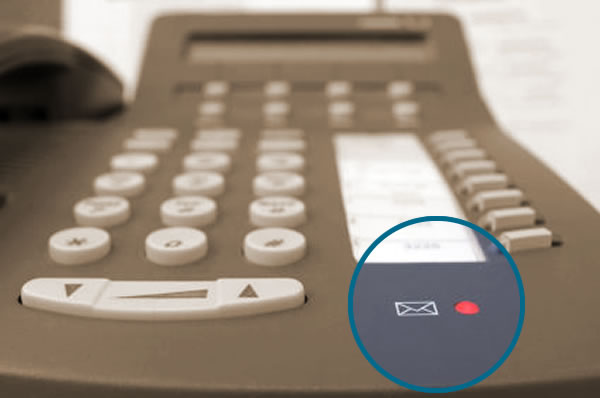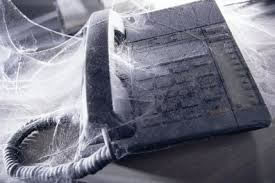
The move to technologies such as email, instant messaging, and unified communications is morphing or displacing technologies that were once must-haves at the office. The fax machine has undergone this transformation over the past decade, with online services replacing the once-dominant stand-alone machine. Now it’s voice mail’s turn.
A growing club
The shift from voice mail has been slow and steady over the past few years, accelerating after the debut of the iPhone and the smartphone revolution it launched. The first signs were there back in 2009 when the New York Times published an article titled You’ve Got Voice Mail, but Do You Care? Since then, a number of businesses have decided that they don’t care about voice mail.

PPG’s headquarters in Pittsburgh.
Last month, PPG, the world’s largest producer of paint, joined the growing ranks of companies that announced their phase-out of fixed-line voice mail from their headquarters in downtown Pittsburgh, where 800 of its 46,000 employees worldwide work. The voice mail system was going largely unused, with employees at the head office opting for tools like email, mobile phones, and instant messaging. If you call a landline at the PPG headquarters and nobody picks it up, you’ll hear a recording telling you that the party you’re trying to reach is unavailable, and that you should call back later or “try an alternative method to correspond”.
Mark Silvey, a spokesperson for PPG, says that cost didn’t drive the move to drop voice mail and that the savings from doing so was “not significant”. “The main driver was to streamline the work environment,” he said.
Other notable companies that have cancelled voice mail include:
- JPMorgan Chase, who deactivated 65% of their voice mail accounts last summer. “We realized that hardly anyone uses voice mail anymore because we’re all carrying something in our pockets that’s going to get texts or e-mail or a phone call, so we started to cut those off,” said Gordon Smith, head of JPMorgan’s consumer and community bank. Unlike PPG, JPMorgan Chase say that there’s some savings involved: $3.2 million, annualized. It’s believed that this move may inspire other financial institutions to follow suit.
- Coca-Cola removed voice mail from 94% of their headquarters’ landlines in December 2014, as a move “to simplify the way we work and increase productivity,” as it was put in an internal memo by their CIO Ed Steinike. The move was about simplifying work and not cutting costs; the savings would amount to less than $100,000 a year.
- In 2012, Thermo Fisher Scientific, a laboratory equipment company with 51,000 employees worldwide, dropped voice mail for all employees except those who needed it, such as those in customer service. This was observed as a move to reduce “information clutter” in a Gartner blog post portentously titled The Beginning of the End of voice mail.
- Even smaller firms are joining in. Money Crashers, a personal finance site that had 35 employees, dropped voice mail in 2012. Their cofounder Andrew Schrage said that voice mail didn’t make sense for an business that was primarily internet-based, and while there was some resistance from his employees, they all bought into it eventually, with the people who wanted voice mail to stay finding that the chat built into GMail was preferable and less intrusive.
Reasons to cancel voice mail
1. If nobody’s using it
 Take it from the carriers themselves: fewer people are using voice mail. Vishy Gopalakrishnan, a manager with AT&T’s unified communications unit, said this of voice mail: “Most people have it, but they don’t end up using it. There are ways to get around it.” Back in 2012, when smartphones and BYOD were less prevalent than they are now, Vonage’s VP of Product Management Michael Tempora told USA Today that the number of voice mail messages left by callers had dropped 8% year over year. Even bigger was the drop in voice mails checked by receivers — 14% fewer voice messages were retrieved by Vonage users in 2012 than 2011.
Take it from the carriers themselves: fewer people are using voice mail. Vishy Gopalakrishnan, a manager with AT&T’s unified communications unit, said this of voice mail: “Most people have it, but they don’t end up using it. There are ways to get around it.” Back in 2012, when smartphones and BYOD were less prevalent than they are now, Vonage’s VP of Product Management Michael Tempora told USA Today that the number of voice mail messages left by callers had dropped 8% year over year. Even bigger was the drop in voice mails checked by receivers — 14% fewer voice messages were retrieved by Vonage users in 2012 than 2011.
This is especially true with younger workers — the 35-and-under set who’ve have never known a world without point-and-click interfaces and spent their adolescence on the internet. Here’s a small sampling of articles on millennials’ relationship with voice mail:
- New York Times: At the Tone, Leave a What? Millennials Shy Away from Voice Mail (June 2014)
- Washington Post: Millennials are right. Voice mails are terrible. (June 2014)
- NPR: Please Do Not Leave A Message: Why Millennials Hate Voice Mail (October 2014)
- Forbes: Why Millennials Are Texting More And Talking Less (July 2015)
Ask your employees if they’d miss voice mail if it were to be eliminated. When JPMorgan Chase offered to eliminate it for employees who don’t directly interact with customers, 65% elected to do so. When Coca-Cola did the same, a mere 6% chose to keep it.
2. Productivity
 We’ll let Harvard Business Review do the talking. Here’s what Michael Schrage wrote in Time to Hang Up on Voice Mail, an article that appeared in the September 2013 issue:
We’ll let Harvard Business Review do the talking. Here’s what Michael Schrage wrote in Time to Hang Up on Voice Mail, an article that appeared in the September 2013 issue:
The truly productive have effectively abandoned voice mail, preferring to visually track who’s called them on their mobiles. Irritated office workers, by contrast, despair that their desk phones can’t display who’s called and when. They’d be far better off if office calls were forwarded to their devices with the relevant Caller IDs attached. Yes, unified communications protocols and technologies were supposed to address these gaps but they’re taking an inordinately long time to do so as other messaging alternatives improve. Google Voice and other audio-to-text transcription services could also obviate the aural inefficiencies but, frankly, few organizations have bothered to make that investment.
The result is the worst of both worlds: A legacy system drag on organizational productivity and individual confusion around the technology’s role and relevance in getting work done. That’s wasteful. What’s worse, it signals enterprise laziness and complacency. What’s the big deal? If people want to call, they’ll call; if the want to text, they’ll text; if they want to email, they’ll email. More choice is used as an excuse for not thinking through how individuals and teams should be productively communicating.
3. Potential cost savings
There’s some disagreement as to whether the savings from cancelling it are significant. At about $10 per user per month, voice mail is an inexpensive telecom service compared to many others. Both PPG and Coca-Cola say that the savings are small (Coca-Cola says they’re saving less than $100,000 a year), while JPMorgan Chase say that their move to eliminate it generates over $3 million in annualized savings. A telecom audit can help you find out how much cancelling voice mail will save your organization.
Regardless of whether or not cost savings is a factor in your decision, be sure to communicate this clearly to your employees if you decide to eliminate voice mail. The internal announcement of voice mail’s impending demise at Coca-Cola led some employees to believe that it was part of a program to cut expenses by $3 billion by 2019, sparking concern and rumors about the possibility of layoffs.
4. Simplicity and security
Consider these in the case where voice mail isn’t used often at your organization. An unused service not only wastes money, but add unnecessary administrative and billing complexity to your telecom environment. It also offers another “attack surface” to be exploited by hackers and other malicious parties.
Reasons to keep voice mail
 For customer-facing employees who communicate largely by phone, voice mail is still useful. A customer who tries to leave a message only to be told to try some alternate means of communication may feel that his or her time has just been wasted. The “high touch” aspects of your business, where personal attention is a differentiator, will still benefit from voice mail, especially if your customer base is 45 or older.
For customer-facing employees who communicate largely by phone, voice mail is still useful. A customer who tries to leave a message only to be told to try some alternate means of communication may feel that his or her time has just been wasted. The “high touch” aspects of your business, where personal attention is a differentiator, will still benefit from voice mail, especially if your customer base is 45 or older.
As with removing voice mail, it’s worth listening to the employees who want to keep it.
Does it serve your business?
In the end, the question you need to ask of voice mail — or anything else in your communications infrastructure — is: does it serve your business, or at least certain parts of it?

One reply on “Is it time for your organization to hang up on voice mail?”
I’ve gone one step further: I’ve dispensed with my office phone altogether. I programmed my extension to forward to my mobile (which has voicemail) because it was just too much of a pain to login to the phone at whatever desk I was using that day or to use the PC-based VoIP client.